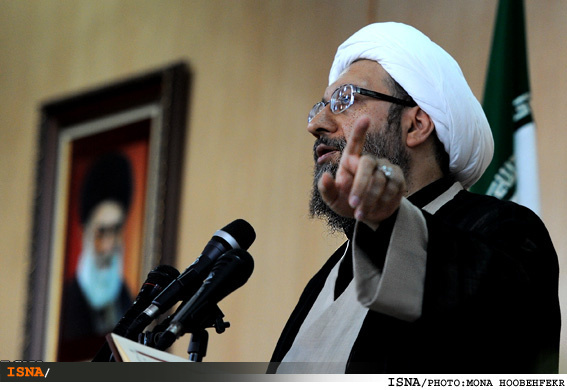Judiciary Chief and IRGC Commander Weigh In On House Arrest
Two Iranian officials made new statements about the judicial aspects of the continued house arrest of government critics Mir Hossein Mousavi, Zahra Rahnavard, and Mehdi Karroubi today.
At his regular meeting with Judiciary officials today, Head of the Iranian Judiciary Ayatollah Sadegh Amoli Larijani said that the Iranian Judiciary’s conduct in the aftermath of the 2009 protests, which he referred to as the “2009 Sedition,” was “completely within the framework of the law,” reacting to a condemnatory statement made on February 14 by Marie Harf, Deputy Spokeswoman for the US State Department, about the third anniversary of the house arrest of Mir Hossein Mousavi, Zahra Rahnavard, and Mehdi Karroubi.
Accusing the West and particularly the US of involvement in the 2009 post-election unrest in Iran, Larijani said that “the issue of the Sedition and its related issues is a completely domestic matter,” according to ISNA. ‘The 2009 Sedition was a move against national interests and 100% against our national security. The apparent US support for this Sedition was outside the customary frameworks, and the recent interferences and statements by Westerners and US officials about the Sedition is even stranger. We assert that this is interference in the internal affairs of the Islamic Republic of Iran and is not acceptable in any way,” said Larijani.
“The treatment of the 2009 Sedition, both from a judicial viewpoint and from a national security one, was carried out completely within the framework of the law,” Ayatollah Larijani said. The Head of the Judiciary said that many of the statements made about the 2009 events came because of “lack of attention and unawareness about all aspects of the Constitution.”
“We are very sorry that some heads of Western countries and the Americans take it upon themselves thousands of kilometers away from our borders to provide guidance to the Islamic Republic of Iran officials and to be concerned about enforcing the Constitution of our country, whereas they should first be concerned about proper enforcement of their own Constitutions and answer why Guantanamo prisoners are not considered prisoners in order to be entitled with the rights reflected in their own laws about prisoners,” he added.
Meanwhile, an IRGC military commander also spoke to reporters about the government critics’ house arrest today. At a meeting with the press outside a Student Basij meeting today, in answer to a question by a reporter asking “What punishment will be decided for ‘Heads of Sedition,'” Major General Mohammad Ali Jafari, commander of the Islamic Revolution Iranian Revolutionary Guards, replied, “Their punishment is the imprisonment they are serving.”
This statement by a military general about the fate of the Green Movement leaders is a stark reminder of the lack of independence of the Iranian Judiciary and the intervention of military and security organizations in its affairs.
The issue repeatedly raised about the situation of Mir Hossein Mousavi, Zahra Rahnavard, and Mehdi Karroubi is that the three opposition leaders have been under house arrest without due process, without being informed of their charges, access to a lawyer, or a trial, while being deprived of regular contact with their families. The Head of the Judiciary’s remarks did not answer which laws allowed the house arrests to continue for three years.
None of the three detained dissidents has been charged with any crime, nor have they had any trial. In addition to Iranian activists and international human rights groups, several different bodies of the United Nations have repeatedly urged the Iranian government to release the opposition figures, including the UN Working Group on Arbitrary Detention and the UN Special Rapporteurs on human rights in Iran, on the rights to freedom of peaceful assembly and association, and on arbitrary detention.
Iranian officials initially placed former presidential candidates Mir Hossein Mousavi and Mehdi Karroubi, along with their wives Zahra Rahnavard and Fatemeh Karroubi, under house arrest on February 14, 2011, after they called for demonstrations in support of the popular uprisings in the region. While they released Fatemeh Karroubi, the other three have remained under house arrest for three years without charges or trial.







